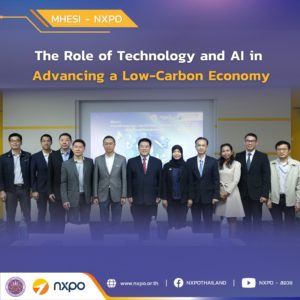Dr. Saravanee Singtong, Director of Sustainable Policy Division at NXPO, recently presented in a webinar titled “Climate Governance & Finance for Climate Transition.” The webinar was part of the “DID YOU KNOW?” webinar series organized by the Carbon Markets Club. Other invited speakers included members of the BCG Model Working Group at the Federation of Thai Industries (FTI) and Mr. Kwanpadh Suddhi-Dhamakit, Senior Country Officer at the World Bank.



During her presentation, Dr. Saravanee discussed NXPO’s role in driving Thailand towards GHG net zero emissions targets. As the national policy agency, NXPO collaborates with stakeholders in Thailand to design and implement higher education and science policies to advance the country’s net zero goals. In addition, NXPO serves as the national designated entity (NDE) for the technology mechanism of the United Nations Framework Convention on Climate Change (UNFCCC). In this capacity, NXPO works closely with the Department of Climate Change and Environment (DCCE) under the Ministry of Natural Resources and Environment to facilitate the exchange and transfer of climate technology between Thailand and international partners. NXPO is also responsible for coordinating activities under the Technology Needs Assessment (TNA) project.

“Our 5-year plan is focused on three initiatives: 1) piloting the low-carbon city models in Saraburi, Rayong and Mae Moh district in Lampang, 2) implementing the Net Zero Campus, and 3) establishing a regulatory framework and upskilling workforces in carbon verification standard (CVS),” explained Dr. Saravanee.

Furthermore, NXPO and Thailand Science Research and Innovation (TSRI) jointly established the Science Research and Innovation (SRI) Consortium for Net Zero, bringing together stakeholders from various sectors to advance Thailand’s net zero emissions and carbon neutrality goals. The consortium serves as a national focal point for net zero policy development, an information center for climate technology, and a central body to facilitate domestic and international collaboration, as well as human resource development in the area of climate change. Dr. Saravanee also outlined the work plan on climate finance to assist Thai businesses in achieving net zero emissions. Initiatives include increasing access to green finance, developing green supply chains, and enhancing BCG capacity in enterprises.






